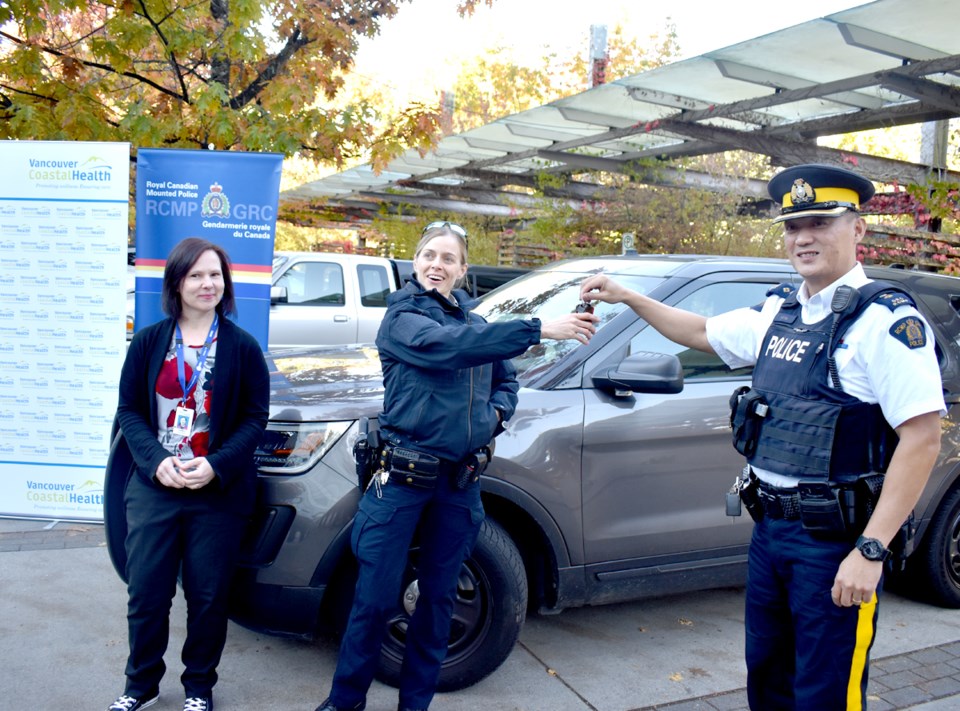Mike Tibbles has been taken to hospital many times while suffering a mental health crisis, and, at times, transportation has been in the back of a police car.
While he said police always treated him with “dignity and respect,” it might have helped to have not just a police officer at his door but also a mental-health worker, someone who could have advocated for him.
Tibbles was at the official launch on Thursday morning of the “Vancouver Coastal Health-Richmond-RCMP Mental Health Car.
Its mandate is to provide a “mobile assessment response” when someone is having a mental health crisis, explained Karen Barclay, director of mental health and substance use with Vancouver Coastal Health (VCH).
Tibbles called the initiative “amazing,” saying the car with its specially trained officers and mental-health nurses will make dealing with people in crisis so much easier.
“Their skills will make people like me feel supported and safe – it’ll help de-escalate a crisis situation,” Tibbles said.
The health authority recognizes mental health as a medical issue, not a criminal issue, explained Barclay. Having the mental-health car, staffed with a team made up of a police officer and mental health nurse, will not only ensure safety but also help the person in crisis accesses the right services.
Mental health calls to the Richmond RCMP have risen dramatically over the past few years. In 2016, there were 1,389 and the number is projected to rise to 2,160 in 2019, an increase of 33 per cent.
The RCMP looked at different models in other communities and tailored their program to fit Richmond, said Richmond RCMP spokesperson Cpl. Dennis Hwang.
"Similar programs in other jurisdictions have proven to be extremely beneficial," he added.
The calls may be received through 9-1-1 or the new mental health number, 604-204-1111. Dispatchers will assess the calls and then decide whether the mental-health car is the best car to respond.
“The goal is to evaluate the current needs of the person and to match them with the best possible service,” Hwang said. “This could include the hospital or a referral to a community-based program.”
Up until this point, mental-health nurses have been going out on an ad-hoc basis to respond to crisis situations. The mental-health car, which did a “soft launch” a month ago with positive results so far, is on duty seven days a week for 12-hour shifts, from late morning to evening. This is the time when most mental-health calls come in, explained Barclay.
The police car is an unmarked cruiser, partly to respect people’s healthcare privacy, Barclay said, but also so people aren’t dissuaded from reaching out for help.
Historically, there has been a misunderstanding about the nature of mental health and addictions, but they are now recognized as medical issues, Barclay said, and there are good treatment options available.
But there is still a ways to go to reduce misconceptions and negative attitudes.
“We still have a long way to go in our communities around stigma – I think shifting our awareness and becoming more compassionate, less judgmental, more responsive and more accessible are all parts of that,” Barclay said.
Hwang explained the mental-health officers were “hand-selected” for these roles, and the team has received training to help them “appreciate the complex nature of mental illness in the context of the range of traumatic events a person may have to experience in their life.
“Team members may have displayed personality traits uniquely suited to this type of work,” Hwang added.
Families and clients have told VCH that it’s hard to know what to do when they’re in crisis, and this mental-health car, Barclay said, is one piece of the puzzle in a continuum of mental-health services.



